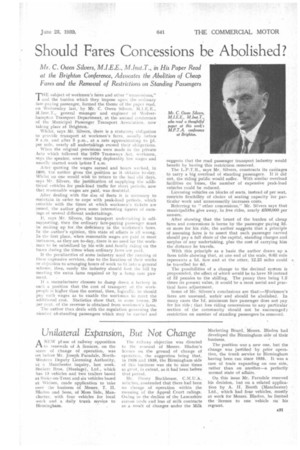Should Fares Concessions be Abolished?
Page 33

If you've noticed an error in this article please click here to report it so we can fix it.
Mr. C. Owen Silvers, M.I.E.E., M.Insi.T., in His Paper Read at the Brighton Conference, Advocates the Abolition of Cheap Fares and the Removal of Restrictions on Standing Passengers
THE subject of workmen's fares and other '' concessions," and the burden which they impose upon the ordinary fare-paying passenger, formed the theme of the paper read, on Wednesday last, by Mr. C. Owen Silvers,
M.Inst.T., general manager and engineer of Wolverhampton Transport Department, at the annual conference of the Municipal Passenger Transport Assectation, now taking place at Brighton.
Whilst, says Mr. Silvers, there is a statutory obligation to provide transport at workmen's" fares, usually before 8 a.m, and after 5 p.m., at a rate approximating to /d. per mile, nearly all undertakings exceed their obligations.
'When the original provisions were made in the private Acts which followed the 1870 Tramways Act, workmen, says the speaker, were receiving deplorably low wages and usually started work lrfore 7 a.m.
After quoting the wages earned and hours worked, in 1899, the author gives the .position as it obtains to-day. Whilst no one would wish to return to the bad old days, says Mr. Silvers, the justification of supplying the additional vehicles for peak-load traffic for short periods, now that reasonable wages are paid, was doubtful.
After dealing with the size of fleets it is necessary to maintain in order to cope with peak-load periods, which coincide with the times at which workmen's tickets are issued, the author gives some interesting figuree of earnings en several different undertakings.
If. says Mr. Silvers, the transport undertaking is selfsupporting, then the ordinary fare-paying passenger must be making up for the deficiency in the workmen's fares. In the author's opinion, this state of affairs is all wrong. In the first place, when reasonable wages are paid in most instances, as they are to-day,. there is no need for the workman to be subsidized by his wife and family riding on the buses Airing the times when. ordinary fares are paid.
If the peculiarities of some industry need the running 01 these expensive services, due to the location of their works or objection to arranging hours of work to fil into a general scheme, then, surely the industry should foot the bill by meeting the extra fares required or by a lump sum pay, ment.
11 a manufacturer chooses to dump down a factory in such a position that the cost of transport of the workpeople is higher than the normal, then, logically, he should pay such wages as to enable the workman to meet the additional cost. Statistics show that, in some towns, 20 per cent, of the revenue is obtained from workmen's fares.
The author then deals with the regulation governing the Member ofestanding passengers which may be carried and suggests that the road passenger transport industry would benefit by having this restriction removed.
The L.P.T.I-3., says Mr. Silvers, constructs its carriages to carry a big overload of standing passengers. If it did not, the riding public would suffer. With similar overload facilities on buses, the number of expensive peak-load vehicles could be reduced.
Licensing vehicles on blocks of seats, instead of per seat, restricts flexibility of choice of seating capacity for particular work and unnecessarily increases costs.
Referring to " other concessions," Mr. Silvers says that municipalitfes give away, in free rides, nearly £500,000 per annum.
After showing that the brunt of the burden of cheap fares and concessions is borne by the passenger paying 2d. or more for his ride, the author suggests that a principle of assessing fares is to assert that each passenger carried should pay a full share of the capital, standing charges and surplus of any undertaking, plus the cost of carrying him the distance he travels.
With this principle as a basis the author draws up a fares table showing that, at one end of the scale, 0.63 mile represents a id. fare and at the other, 12.23 miles could • be travelled for 6d.
The possibilities of a change to the decimal system is propounded, the effect of which would be to have 10 instead of 12 pennies to the shilling. The penny then being 1.2 times its present value, it would be a most useful and practical fares adjustment.
Some of Mr. Silvers's conclusions are that—Workmen's fares are unsound, unfair. and should be abolished. In many cases the id. minimum fare passenger does not pay for his ride; that free riding concessions to any particular section of the community should not be encouraged;. restriction on number of standing passengers be removed.












































































